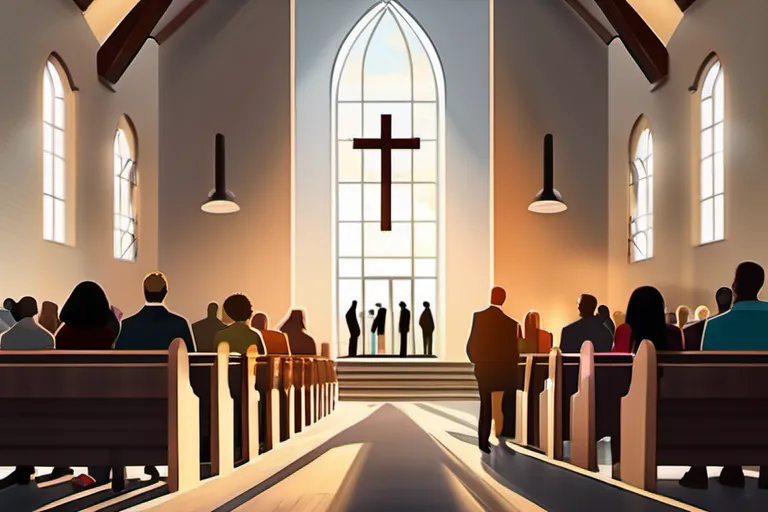Exploring the Significance of Non-Denominational Churches in Modern Times
In today’s diverse and multicultural society, non-denominational churches have gained significant attention. This article delves into the importance of these churches and their role in contemporary society.
The Rise of Non-Denominational Churches
The rise of non-denominational churches in today’s society has been nothing short of remarkable, much like a wildfire spreading through parched land. But why did this phenomenon occur? Could it be that traditional religious structures have become too rigid and unresponsive to the changing needs of people?
Historically, denominations were formed as early Christians sought to organize themselves around shared beliefs and practices. However, over time, these groups became more focused on doctrinal purity than on reaching out to those outside their fold. This rigidity sometimes created barriers rather than bridges.
Enter non-denominational churches. They sprang up like flowers after a spring rain, offering a fresh approach to faith. These churches are often seen as the modern-day equivalent of a grassroots movement, where anyone can join without having to go through layers of bureaucracy or adhere strictly to dogma. Instead, they focus on the core message of Jesus Christ and offer an inclusive environment for spiritual growth.
Imagine a church that’s not defined by its rules but by its love; where people aren’t judged by their background but by their willingness to embrace change and growth. This is what non-denominational churches are all about. They challenge us to ask: Can religion be more than just tradition? Could it be a dynamic, evolving journey?
As we explore further into the unique features of these churches in the next chapter, let’s ponder: In an era where social media can spread misinformation as quickly as truth, do non-denominational churches provide a safer haven for genuine spiritual exploration and community building?
The Unique Features of Non-Denominational Christianity
Imagine non-denominational Christianity as a vast, open field where every believer can plant their own seeds of faith without worrying about predefined boundaries. Unlike traditional denominations that often follow strict doctrines and rituals, these churches offer a flexible approach to worship and belief. How does this unique feature set them apart?
Non-denominational churches emphasize individuality in spiritual practices, much like how a gardener chooses their own varieties of flowers rather than sticking to a single type. This freedom allows members to explore different beliefs and practices without feeling trapped by rigid structures. It’s like finding the perfect shade of paint for your living room – there are many options, but you choose what fits best.
These churches also prioritize personal growth over adherence to rules. Think of them as paths through a dense forest, each offering unique perspectives and lessons. Instead of following one specific trail, individuals can explore different routes based on their needs and experiences. This adaptability means that non-denominational Christians can find comfort and guidance in ways that resonate with their lives.
Their openness to diverse beliefs and practices also makes them a melting pot of ideas and faiths. It’s like gathering ingredients from various cuisines to create a unique recipe – the result is something fresh, innovative, and appealing to a wide audience. This inclusivity attracts people from different backgrounds who might feel excluded by more traditional churches.
Moreover, non-denominational Christianity often encourages community and mutual support. Picture a group of friends sharing stories and challenges, learning together, and providing comfort during tough times. Unlike some denominations that may focus heavily on doctrine, these churches foster a sense of belonging where everyone’s journey is valued and supported.
So, why does this unique flexibility matter in today’s society? It allows individuals to find their own spiritual homes, making faith more personal and meaningful. In an era marked by rapid change and diverse beliefs, non-denominational churches offer a sanctuary that adapts to the ever-evolving landscape of human spirituality.
In essence, these churches serve as vibrant ecosystems where every soul can thrive, not just survive. Their ability to embrace diversity and provide flexible pathways to faith makes them indispensable in today’s complex world.
Inclusive and Welcoming Environment
In today’s society, where diversity and acceptance are more than just buzzwords but essential values, non-denominational churches stand out as beacons of inclusivity. How do they manage to create such a welcoming atmosphere? By embracing every believer without judgment or precondition, these churches have become more than places of worship; they’ve evolved into communities that mirror the diverse tapestry of human experience.
Imagine walking into a non-denominational church for the first time. The atmosphere is often one of warm familiarity rather than formal rigidity. Here, people from all walks of life come together, sharing their stories and finding solace in each other’s company. This environment invites everyone to participate without feeling like they have to fit into a predefined mold. It’s akin to walking into a garden where every flower is welcome, whether it be the common violet or the rarest orchid.
Non-denominational churches often embrace a flexible approach to beliefs and practices. They don’t enforce strict doctrines that might alienate some members; instead, they encourage individual exploration of faith. This flexibility allows individuals to find their own path within the religion, much like choosing your own route through a labyrinth, where every turn offers new insights but none are compulsory.
Moreover, these churches frequently host events and activities that cater to various interests and needs. From community service projects to cultural festivals, there’s always something for everyone. This diversity in offerings ensures that the church remains relevant and engaging, much like a buffet where every dish is delicious in its own way.
In essence, non-denominational churches are not just places of worship; they’re vibrant ecosystems of faith that thrive on inclusivity. They embody the spirit of acceptance, making them indispensable in today’s society, where diversity and mutual respect are paramount.
The Role of Non-Denominational Churches in Modern Society
The Role of Non-Denominational Churches in Modern Society
Have you ever wondered how non-denominational churches have become such a significant force in today’s society? These churches, often seen as more flexible and adaptable, play a crucial role in building strong communities and fighting for social justice. Imagine a church not defined by rigid doctrines or hierarchical structures—how would it shape the way people come together?
Non-denominational churches have become beacons of hope in many communities, offering a space where individuals can find solace, support, and a sense of belonging. Think about how these churches often serve as hubs for social activities, fostering connections among people from diverse backgrounds. These spaces are more than just places of worship; they’re vibrant centers of community life.
But the impact of non-denominational churches doesn’t stop at community building. They also take on the mantle of social justice advocates. How do these churches address issues like poverty, inequality, and discrimination? By providing tangible support to those in need—food banks, shelters, educational programs—they tackle problems head-on. It’s as if these churches are small armies, fighting for a better world, one community at a time.
Moreover, non-denominational churches often lead the way in innovation and outreach. Their flexible nature allows them to adapt quickly to new challenges and opportunities. This agility means they can be more responsive to societal changes, whether it’s through online services or social media campaigns aimed at raising awareness about important issues.
In essence, non-denominational churches are like lighthouses in the stormy sea of modern society—they guide, support, and inspire. They embody a spirit of openness and inclusivity that is necessary in our increasingly complex world. As we navigate through these uncertain times, it’s clear that their role cannot be overstated.
The Future of Non-Denominational Christianity
As we look towards the future, one question lingers: how will non-denominational Christianity evolve? Will it continue to thrive as a vibrant, dynamic force in society, or is it destined for a slow decline? Is non-denominational Christianity merely a temporary trend, or does it hold the potential to reshape religious landscapes?
The future of non-denominational churches seems intertwined with the changing nature of belief and practice. As technology continues to revolutionize how we connect and communicate, will these churches adapt by embracing digital platforms and virtual communities? Imagine a non-denominational church where members gather not just in physical spaces but also in online forums, sharing their faith through live streams and interactive discussions—could this be the key to its longevity?
Another trend that might shape the future is the increasing importance of social justice. Non-denominational churches have long been at the forefront of community-building efforts, addressing issues like poverty, inequality, and environmental sustainability. Will these churches continue to lead in this area, becoming more than just places of worship but also centers for activism? The answer might lie in their ability to remain relevant by staying engaged with societal needs.
Moreover, the growing diversity of society could influence non-denominational Christianity. As communities become more multicultural and multifaith, how will these churches adapt to include people from different backgrounds and beliefs? Will they thrive on this diversity or struggle to maintain their traditional structures?
The implications for the future are vast. If non-denominational churches can successfully navigate these trends—embracing technology, prioritizing social justice, and embracing diversity—they might not just survive but flourish in a rapidly changing world. The challenge lies in staying true to their core values while being flexible enough to evolve with the times.
But one thing is certain: non-denominational Christianity’s role in society will continue to be pivotal. Will it become more influential or less relevant? The answer depends on its ability to adapt, innovate, and remain a beacon of hope and community in an increasingly complex world?
Addressing Common Misconceptions about Non-Denominational Churches
Why do people still hold onto misconceptions about non-denominational churches? Are they really just ‘fringe’ sects without any real structure, as some might believe? Let’s break down a few common myths and explore why these beliefs are unfounded.
One popular misconception is that non-denominational churches lack any form of organization or hierarchy. This couldn’t be further from the truth. While they may not follow the traditional denominational structures, non-denominational churches often have well-defined leadership roles and governance systems in place to ensure smooth operations and spiritual guidance.
Another misconception is that these churches are too focused on individualism and personal beliefs, neglecting community support and unity. In reality, many non-denominational churches emphasize strong community bonds and mutual support among members. They often thrive on the diversity of thought and personal interpretation, creating a rich tapestry of spiritual experiences.
Some people also believe that these churches lack any form of doctrinal foundation or consistency in teachings. However, this couldn’t be more incorrect. Non-denominational churches often have clear and well-articulated beliefs about God, Jesus Christ, salvation, and the Bible, which are discussed and reinforced during sermons and Bible studies.
Is it true that non-denominational churches lack a sense of tradition or historical significance? Not at all! These churches often draw inspiration from centuries-old teachings and practices but adapt them to fit modern contexts. They see their unique approach as a way to remain relevant and faithful in today’s rapidly changing world.
Are these churches really just about attracting new members, neglecting the needs of long-time followers? On the contrary, non-denominational churches are known for their focus on nurturing existing members while also reaching out to newcomers. They believe in a holistic approach to faith and life, addressing both spiritual and practical concerns.
By dispelling these common misconceptions, we can better understand the significance of non-denominational Christianity in today’s society. These churches offer a flexible, adaptive, and deeply personal form of worship that resonates with many people seeking a more meaningful connection with their faith. They continue to thrive because they meet real needs and provide a space where individuals can grow spiritually without feeling constrained by rigid structures or dogmas.
Conclusion
 Ultimately, non-denominational Christianity offers a unique blend of faith and inclusivity that resonates with many individuals today. By understanding its significance, we can foster greater unity and mutual respect among believers.
Ultimately, non-denominational Christianity offers a unique blend of faith and inclusivity that resonates with many individuals today. By understanding its significance, we can foster greater unity and mutual respect among believers.











